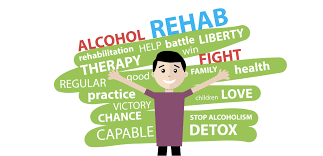Alcohol maybe a legal drug, but one that carries a major risk of addiction.
Some of the foremost common physical, psychological, and behavioral signs and symptoms of substance abuse are:
- Poor coordination
- Slurred speech
- Impaired thinking
- Memory impairment
- Want to stop drinking but not managing to try and do so
- Diverting energy from work, family, and social life to drink
- Being secretive about the extent of the drug abuse to shield it
- Engaging in risky behaviour, like drunk driving
- Being in denial about the extent of the drug abuse problem
- Becoming distressed at the prospect of not having access to alcohol
When an individual who regularly abuses alcohol stops drinking or significantly reduces the number of intakes, withdrawal symptoms will emerge. Such symptoms can begin as soon as two hours after the last drink and continue for weeks. Symptoms can include shaking, anxiety, and also the desire for a drink. DTs (DTs), a severe symptom, can include confusion, fever, and rapid heartbeat. there’s general advisement that alcohol withdrawal should occur under the care of a doctor specializing in addiction treatment, as some withdrawal symptoms are life-threatening.
Behavioural Signs of alcoholic abuse
As the National Council on Alcoholism and Drug Dependence explains, the behavioural signs of an alcohol use disorder will usually be apparent. people that experience alcoholism abuse may become increasingly secretive about their activities because they’ll not want to listen to people’s concerns or get advice to prevent. The individual may additionally drink secret, either in a very private place or get in public but far from concerned friends and family.
As a result of drinking, people may become more vulnerable to accidents and show signs of injury, which they’ll try and cover. a person who is experiencing an alcohol use disorder might also hide alcohol around the house or at work. an individual may become afraid of running out of alcohol and go to alcohol rehabilitation centre, which successively means they keep a ready supply nearby.
Alcohol abuse may also lead people to point out a diminished level of look after their hygiene and physical appearance. As alcoholism abuse progresses, the individual may look increasingly as if they need not be showering, have stopped shaving, and are not any longer washing or changing their clothes. alcoholism abuse often ends up in problems within the person’s relationships across the total spectrum of life. someone who incorporates a rather calm effect when sober may shift into moodiness, depression, or irritability when intoxicated.
Additional behavioural signs of substance abuse include:
- Increasing legal troubles, like assault, domestic abuse, or drunk driving
- Showing up intoxicated at work, a family function, or a gathering
- Yo-yoing: drinking and so stopping during a repeated pattern over time
- Overreacting to any perceived criticism levelled against their drinking
- Experiencing increasing financial problems
- Uncharacteristically taking loans, liquidating any assets, and depleting cash accounts
- Stealing and certain lying about it
- Engaging in risky activities, like unprotected sex
The Prevalence of alcoholic abuse and Drunk Driving
One of the foremost troubling behavioural signs of an alcohol use disorder is drunk driving. The well-known nonprofit organization Mothers Against Drunk Driving publishes reliable statistics on drunk driving.
- In 2013, 28.7 million Americans reported that they drove after drinking.
- In 2014, 9,967 Americans died in car crashes that involved alcohol. This statistic translates to a fatal car crash every 53 minutes within the US. That’s about 27 fatalities daily.
- In 2014, about 290,000 Americans were injured in a very car accident that involved drinking. This statistic translates to a car accident injury every two minutes.
- On average, someone will drive drunk 80 times before being arrested for the primary time.
If you or someone you recognize are showing signs of being drunk, don’t allow them to drag the wheel.
Are the Symptoms of alcoholic abuse Reversible?
Most people with an alcohol use disorder who experience brain or cognitive troubles will recover with treatment within a year of sobriety. In some instances, it can take much longer. the result of recovery and sustained sobriety depends on a bunch of medical, personal, and physiological factors. The primary step in recovery from an alcohol use disorder is seeking treatment from a rehab centre like Akrura alcohol de-addiction centre that gives exemplary clinical services and compassionate care.
